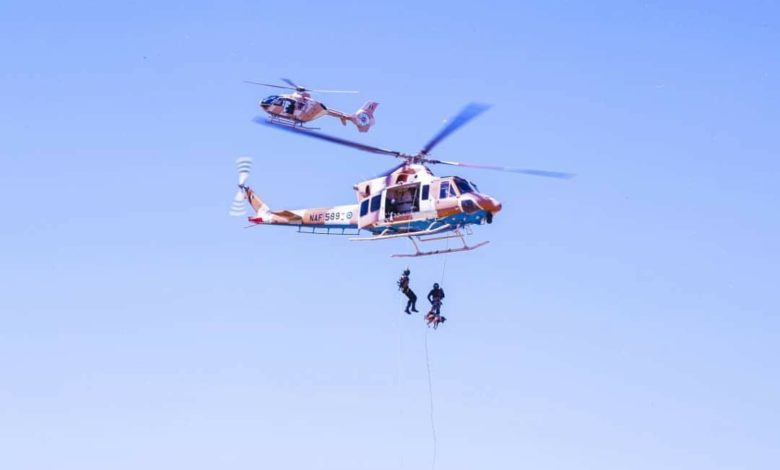Nigerian Military Reach Alpha Jet Crash Site, Continue Investigation
A combat search team has arrived at the crash site of the Nigerian Air Force Alpha jet-NAF 475 in Sambisa forest, Northeast Nigeria.

The Nigerian military search team has found the location of the missing light attack jet in the dreaded Sambisa area of Borno State, Northeast Nigeria, HumAngle has learnt.
The Air Force advanced trainer and tactical-support two-seater Alpha Jet, co-manufactured by Dassault of France and Dornier of Germany, went missing on Wednesday, March 31, while on a support mission for ground troops, when it lost radar contact.
On Friday, April 2, Abubakar Shekau led Boko Haram faction released a video showing the debris of the aircraft and fighters in gun trucks firing at the aircraft before the crash.
HumAngle had earlier reported that the video was edited, a tactic used in amplifying the group’s infowar campaign.
HumAngle understands that the Air Force is dispatching a team to the location in addition to the ground team, as part of efforts to recover the wreckage and pilots: Flight Lieutenant Chapele Ebiakpo and Flight Lieutenant John Abolarinwa.
Although the official cause of the crash has not been made public, there are fears that technical or anti-aircraft guns may be connected to the sequence of events that resulted in the aircraft coming down in a contested area.
HumAngle has also learnt that Air Force fixed and rotary aircraft have previously been targeted by anti-aircraft guns, requiring pilots to fly higher above the effective range of such weapon systems.
The air force Alpha jet occasionally flies low to deliver its unguided weapon payload. It’s also unclear if this mission involved a pair of Alpha Jet and surveillance aircraft.
A-jets are a critical component of Nigerian Airforce training and combats operations
The first batch of Alpha jets was acquired by the government in the 1980s and later weaponised to support Nigerian troops conducting Economic Community of West African States Monitoring Group (ECOMOG) duties in the 1990s.
HumAngle understands that earlier delivery involved over 20 Alpha Jet E advanced training oriented variants in 2015, during the peak of the military efforts to thwart the growing Boko Haram insurgency, before the Air Force began receiving pre-owned Alpha Jet A tactical support-oriented variants from Air USA Inc.
The crashed Alpha Jet with callsign NAF 475 was part of the deliveries from the United States which started with two Alpha Jets (NAF475 and NAF477) in March and May 2015, a third (NAF478) in June 2016 and fourth (NAF476) in December 2018.
Although the Air USA Inc variants were delivered demilitarised, the Air Force reconfigured the aircraft for combat by arming them with rocket launcher pod, unguided bomb and belly cannon pod, a similar configuration used by the earlier Alpha Jet E employed for combat operations.
The home base of the two variants is 407 Air Combat Training Group Kainji in Niger State, some of the aircraft are stationed at 103 Strike Group Yola in Adamawa State, and 105 Composite Group, Maiduguri in Borno State to support the Air Task Force campaign in support of operation against Boko Haram factions.
Over the past years, the Alpha Jets have been the workhorse of the Air Force fixed-wing combat aircraft alongside the F7-NI lightweight fighter jets which are currently offline due to maintenance, and a few years ago, the L-39ZA Albatros light attack and trainer aircraft were weaponised and subsequently deployed for combat operations.
In recent years, Alpha jets have been lost on operations including NAF 475 on March 31. In Sept. 2014, another Alpha jet NAF 466 went down in Sambisa, the pilot was killed and the co-pilot has been missing ever since. In May 2014, a Nigerian Alpha jet stationed in the Niger Republic for African-led intervention Force in Mali, AFISMA, crashed and led to the death of the two pilots on board.
HumAngle has learnt that a number of the Alpha Jets stationed in Maiduguri were damaged by a windstorm in 2020, thereby affecting the number of aircraft types available for combat support missions.
Support Our Journalism
There are millions of ordinary people affected by conflict in Africa whose stories are missing in the mainstream media. HumAngle is determined to tell those challenging and under-reported stories, hoping that the people impacted by these conflicts will find the safety and security they deserve.
To ensure that we continue to provide public service coverage, we have a small favour to ask you. We want you to be part of our journalistic endeavour by contributing a token to us.
Your donation will further promote a robust, free, and independent media.
Donate HereStay Closer To The Stories That Matter




